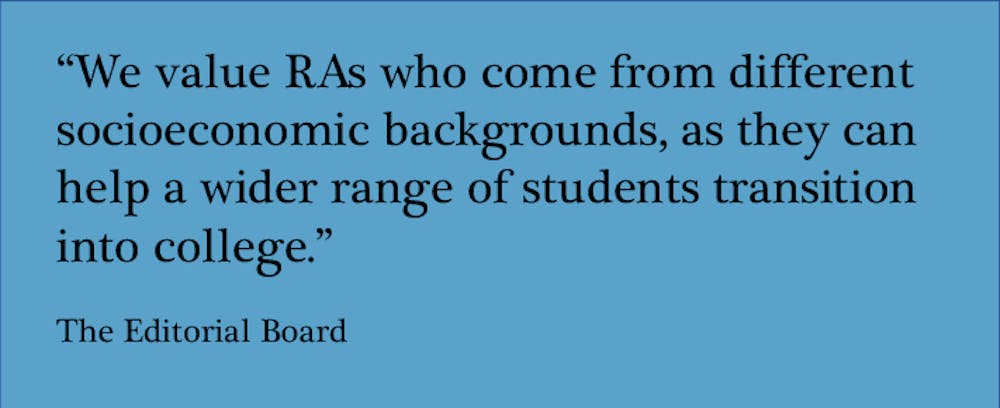Residential Advisors (RAs) are some of the first people we meet upon arriving at Hopkins. They shape our first year experience and ease us through the transition from high school to college. The responsibilities of an RA go beyond just the hours they spend on duty. The job is vital to the emotional wellbeing of students and the position can often be emotionally, physically and psychologically taxing on RAs themselves.
RAs are compensated for their work with a free meal plan and housing in a University residence hall, which has a total estimated value of $16,858 for the 2017-2018 school year. Students expect that this compensation will reduce their overall costs for the year, but that is not always true for those on financial aid. When RAs accept the position, the Student Financial Services (SFS) office reevaluates their aid packages by taking into account the monetary value of their room and board.
In this reevaluation process, SFS may reduce an RA’s financial aid by the very same amount RA’s are compensated. As a result, some RAs may never see the financial benefits of their work.
According to a survey conducted by RAs, 50 percent of RAs on financial aid experience no increase or decrease in out of pocket cost. Even for students who do experience a reduction in costs, some report it to be as minimal as $1,000. Worse still, in the same survey, 25 percent of RAs on financial aid reported an increase in their overall costs. In other words, they are paying to work as an RA.
The consequences of this compensation policy disproportionately affects those from lower income households, who are more likely to depend on aid packages than their peers. Meanwhile, RAs who are not on financial aid receive the full monetary benefits of their work.
We value RAs who come from different socioeconomic backgrounds, as they can help a wider range of students transition into college. Hopkins claims to value them as well, having specifically pushed to widen the applicant pool over the past few years. And certainly, any student who wants to be an RA should be encouraged to apply, but Hopkins should be obligated to ensure that doing so will not negatively impact students’ financial situations.
We are disappointed that the University has not rectified a system under which some of its RAs are exploited. We understand that it is a common practice for changes in financial status to then affect the financial aid provided. However, students’ financial aid should not be penalized when they provide a service to the University and its student body.
RAs play a vital role in their residents’ transition to college, mental health and wellbeing. The recent Mental Health Task Force report highlighted that a staggering number of our peers reported feeling suicidal, and many are overwhelmed by their workload and the pressure to succeed at school.
RAs are important figures in helping students grow and feel like they have someone to talk to, and this is crucial to creating a healthier campus. RAs should be compensated appropriately for the important services they provide, regardless of their socioeconomic background.
Furthermore, we are disappointed that the University has been keeping RAs in the dark about how their aid statuses would be affected by accepting the position. Right now, the RA selection process is structured so that students accept the position without knowing how their financial aid may change. RAs have to commit early in the spring semester for positions for the coming year, but they don’t receive new aid packages until the summer.
In the time between these two periods, other students find their housing for the next year. However, if prospective RAs realize over the summer that they can’t afford to hold the position and decline it, they are often unable to find affordable housing so last minute. The University should have been clearly communicating to prospective RAs about how their financial aid would be affected in order to prevent them from being put in such a position.
However, moving forward, we hope that the RAs will not have to worry about their financial aid changing because of their job. We encourage Hopkins to think about how they can more equitably compensate RAs who provide many students with accessible support, and are an incredibly important resource for coping with the difficulties of being a student at Hopkins.
We understand that RAs on financial aid are not technically being compensated any less than their peers. However, subtracting this compensation from their aid packages is discriminatory in the long run. RAs should receive free housing and dining in addition to any aid they would have received as a non-RA. They should not be penalized for choosing to help their fellow students and the University.

















